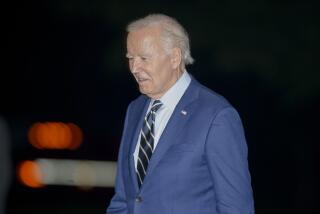Netanyahu, Mubarak Talk Peace
- Share via
CAIRO — On his first official visit to the Arab world, Israeli Prime Minister Benjamin Netanyahu on Thursday received a stern lecture on peacemaking from Egyptian President Hosni Mubarak along with a goodwill pat on the back.
Netanyahu, in turn, promised his host that he would abide by the agreements that Israel already has signed with its Arab neighbors, but he presented no major initiatives for reviving stalled peace negotiations with the Palestinians and Syria.
The leaders held two hours of private, get-acquainted talks aimed at reducing tensions between Israel and the Arab world that have been mounting since the right-wing Netanyahu’s May 29 election victory.
After the meeting at Cairo’s Al Itihadiya Palace, Mubarak warned the Israeli leader that his insistence on achieving peace with security should be “put into the right perspective,” which is that formal peace agreements are the only way to guarantee Israel’s security and stability.
“Violence and terrorism spread only in an atmosphere of despair and frustration which emanate from a feeling of injustice,” Mubarak said at a news conference with Netanyahu.
Mubarak was the old pol lecturing the new, the leader of the first Arab state to make peace with Israel 19 years ago telling the neophyte how it is done--or not done.
He urged Netanyahu to resume talks with the Palestinians and Syria but advised him not to attempt to renegotiate what already has been agreed upon.
The “cardinal rule” of Middle East peace negotiations, Mubarak said, is to consider all issues open for negotiation.
He was clearly referring to Netanyahu’s stance against any sharing of power over Jerusalem and against recognition of a Palestinian state--issues that are supposed to be decided in final Israeli-Palestinian negotiations.
Despite the speech, both sides avoided hard issues and barbed rhetoric, bending over backward to portray their meeting in a positive light.
Last month, Mubarak hosted a pan-Arab summit--the first in six years--to assess Netanyahu’s election victory.
The Arab leaders effectively threatened to halt the normalization of relations with Israel if Netanyahu abandoned Israel’s commitment to trade land for peace and stopped negotiations with Syria and the Palestinians.
In a gesture to Mubarak, Netanyahu announced that Israeli Foreign Minister David Levy will hold his administration’s first top-level meeting with Palestinian leader Yasser Arafat next week.
He also said Israel will further loosen its closure of the West Bank and Gaza Strip to allow an additional 10,000 Palestinians to return to their jobs in Israel after a nearly five-month closure.
About 25,000 married Palestinians older than 30 will be working in Israel, compared with about 70,000 before the closure was imposed in February because of suicide bombings by Islamic extremists opposed to Israeli-Palestinian peace moves.
“Our intention is to make life easier and to make an open economy, an open relationship rather than a closed one,” Netanyahu said.
Israel Radio, meanwhile, reported that President Ezer Weizman had agreed to pardon Palestinian female prisoners convicted of murdering Jews. The release of Palestinian prisoners is called for under the September 1995 Israeli-Palestinian peace agreement.
Weizman had refused to pardon prisoners “with Jewish blood on their hands” during a mass prisoner release last fall.
In agreeing to the pardons Thursday, he added the release of four Jewish men accused of murdering Arabs.
In Cairo, the security for Netanyahu’s visit was intense, with the streets he traveled blocked to traffic and lined with soldiers.
Netanyahu stopped on the way to his meeting with Mubarak to lay wreaths at Egypt’s Tomb of the Unknown Soldier and the burial site of President Anwar Sadat, who was killed by Muslim militants in 1981.
Sadat was the first Arab leader to make peace with Israel after a visit to Jerusalem in 1977.
After talks and lunch, Netanyahu took an aerial tour of the Giza pyramids in a convoy of three Egyptian military helicopters--security apparently prevented him from making the trip by road--while Mubarak lauded the prime minister and gave the meeting a positive appraisal for the Israeli press.
Mubarak said Netanyahu’s hard-line speeches in the Israeli parliament and U.S. Congress in the last month had stunned him and had suggested the peace process would fold, but he said Thursday’s meeting had changed his mind.
“When I met him today, I had a clear picture about what could happen, a clear picture he is going to go through the peace process. He is ready to negotiate here and there. This may give some relaxation to the whole country, to the Cabinet, to public opinion mainly,” Mubarak said.
Netanyahu summarized the meeting as a clearing of the air.
The two left the news conference with Mubarak patting him on the back.
More to Read
Sign up for Essential California
The most important California stories and recommendations in your inbox every morning.
You may occasionally receive promotional content from the Los Angeles Times.













